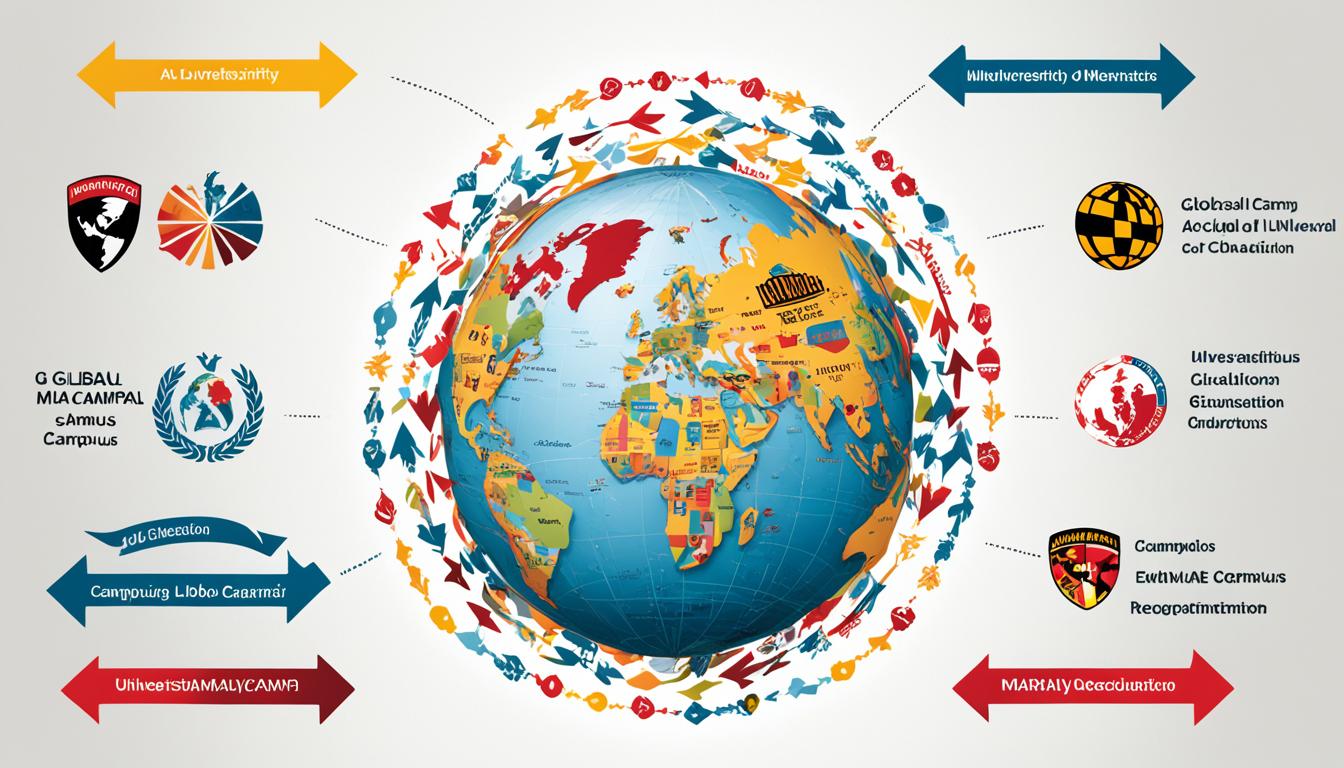The University of Maryland Global Campus (UMGC) is a well-respected institution that offers a wide range of programs for students seeking a quality education. One crucial aspect to consider when choosing a university is its accreditation status. Accreditation ensures that the institution meets certain quality standards and provides students with a reputable education.
UMGC is accredited by the Middle States Commission on Higher Education (MSCHE), which is a regional accrediting body recognized by the U.S. Department of Education. This accreditation certifies that UMGC has undergone a rigorous evaluation process and meets the required standards of excellence.
Receiving accreditation from MSCHE signifies that UMGC’s programs, faculty, curriculum, and student support services meet recognized educational benchmarks. It offers assurance to students and employers that UMGC provides a quality education that is recognized and respected in the academic and professional realms.
UMGC offers a wide range of accredited programs in various fields, including business, computer science, cybersecurity, and more. By choosing an accredited program at UMGC, students can be confident that their degree holds value and opens doors to further educational opportunities and career advancements.
Key Takeaways:
- Accreditation of a university ensures that it meets certain quality standards.
- University of Maryland Global Campus (UMGC) is accredited by the Middle States Commission on Higher Education (MSCHE).
- UMGC provides a reputable education and offers accredited programs in various fields.
- Accreditation enhances the value of a degree and opens doors to career opportunities.
- Verification of accreditation status is crucial when choosing a university.
Understanding the Accreditation Process
Accreditation is a voluntary process that higher education institutions undergo to demonstrate their commitment to quality education and continuous improvement. Through the accreditation process, institutions aim to ensure that they meet established standards of educational excellence and provide students with a reputable learning experience.
Accrediting bodies play a crucial role in this process. These organizations, such as the Middle States Commission on Higher Education (MSCHE), evaluate institutions based on a set of criteria that cover various aspects of their operations. These criteria may include faculty qualifications, curriculum design, student support services, and institutional effectiveness.
The accreditation process typically involves several steps. Institutions begin with a self-assessment, where they evaluate their own performance against the accreditation standards. This helps identify areas for improvement and guides the development of an action plan to address any gaps or deficiencies.
After the self-assessment, institutions undergo a peer review. Accrediting bodies typically assemble a group of experts from other institutions to evaluate the institution’s self-assessment report, conduct interviews, and provide feedback.
“The accreditation process ensures that institutions are held accountable for the quality of education they provide and the services they offer to students.”
Site visits are also an important part of the accreditation process. Representatives from the accrediting body visit the institution to assess its facilities, interact with faculty, staff, and students, and gather additional information to evaluate the institution’s compliance with the accreditation standards. These site visits help provide a comprehensive assessment of an institution’s operations and enable a thorough evaluation of its commitment to quality education.
Accreditation is not a one-time event but rather an ongoing process. Once an institution receives accreditation, it must continue to maintain and improve its standards to ensure that it meets the requirements set by the accrediting body. Institutions undergo periodic reviews and updates to demonstrate their continued compliance with the standards and to maintain their accredited status.
Accrediting Bodies
Accrediting bodies are organizations that have been recognized by the U.S. Department of Education to assess and certify the quality of education provided by higher education institutions. These bodies, such as MSCHE, play a critical role in ensuring the credibility and reliability of the accreditation process.
Each accrediting body has its own set of standards and processes for assessing institutions. Institutions seeking accreditation must meet the specific requirements of the accrediting body they choose to undergo the process with.
Accreditation by a recognized accrediting body is essential for institutions as it provides validation of the quality of their programs and institutional practices. With accreditation, institutions gain credibility, demonstrate their commitment to excellence, and ensure that their degrees are widely recognized and respected.
The accreditation process, conducted by recognized accrediting bodies, ensures that the education provided by higher education institutions meets established quality standards. By voluntarily undergoing this process, institutions demonstrate their dedication to providing a high-quality education and continuous improvement.
| Benefits of Accreditation | Accreditation Process | Accrediting Bodies |
|---|---|---|
| Ensures quality education | Voluntary process | Recognized by the U.S. Department of Education |
| Credibility and reputation | Self-assessment | Evaluates compliance with standards |
| Transferability of credits | Peer review | Defines specific requirements |
| Recognition by employers | Site visits | Ensures credibility |
| Access to financial aid | Ongoing process | Validates program quality |
Understanding the accreditation process and the role played by accrediting bodies can help students, educators, and institutions make informed decisions regarding higher education. By choosing an accredited institution, individuals can have confidence in the quality of education they receive and ensure that their degrees are widely recognized in the job market and beyond.
Importance of Accreditation
Accreditation plays a crucial role in higher education for several reasons. Firstly, it assures students that the institution meets certain quality standards and that their degree will be recognized and respected by employers, licensing boards, and other educational institutions. Accreditation provides students with the confidence that they are receiving a reputable education that meets recognized educational standards.
One of the significant benefits of accreditation is the transferability of credits between institutions. Accredited institutions have agreements in place that allow students to seamlessly transfer their credits to other accredited institutions. This is particularly important for students who may want to pursue further education, such as a master’s degree or professional certifications, as it eliminates any limitations or obstacles in the credit transfer process.
Furthermore, many employers prefer to hire candidates with degrees from accredited institutions. Accreditation demonstrates the institution’s commitment to providing a quality education and ensures that graduates possess the necessary knowledge and skills needed in the workforce. Employers recognize the value of degrees from accredited institutions, giving accredited graduates an advantage in the competitive job market.
Accreditation provides students with the confidence that they are receiving a reputable education that meets recognized educational standards.
Overall, accreditation plays a crucial role in ensuring the quality and consistency of higher education. It provides students with assurance, enhances their job prospects, and enables them to pursue further education without limitations. By choosing an accredited institution like the University of Maryland Global Campus (UMGC), students can rest assured that they are on the path to a successful and recognized education.
UMGC’s Accreditation and Programs
UMGC is committed to offering a wide range of accredited programs that provide students with quality education and valuable skills. As a whole institution, UMGC’s accreditation covers all its programs, including undergraduate and graduate degrees.
Whether you’re interested in business, computer science, cybersecurity, or other fields, you can find accredited programs at UMGC that align with your career goals. These programs have been reviewed and approved by the accrediting body, ensuring they meet the highest standards of quality and academic rigor.
“UMGC’s accreditation demonstrates our dedication to providing students with a reputable education and preparing them for success in their chosen fields.”
– Dr. Gregory Fowler, President of UMGC
To maintain its accredited status, UMGC undergoes regular reviews and assessments. These evaluations ensure that UMGC continues to meet the accreditation standards set by the accrediting body. Through these reviews, the university identifies areas for improvement and takes action to enhance the quality of its programs.
Continuous improvement is a fundamental value at UMGC. The university is committed to regularly updating its curriculum and instructional methods to incorporate the latest industry trends and best practices. By staying current with advancements in each field, UMGC ensures that its students receive a relevant and engaging educational experience.
Accreditation Maintenance at UMGC
UMGC’s commitment to accreditation maintenance involves a comprehensive approach that focuses on several key areas:
- Faculty Qualifications: UMGC employs experienced faculty members who possess the necessary academic credentials and professional expertise.
- Curriculum Development: UMGC designs its programs based on industry standards and emerging trends, ensuring their relevance and applicability in the real world.
- Student Support Services: UMGC provides robust support services to help students succeed academically, including tutoring, career counseling, and online learning resources.
- Institutional Effectiveness: UMGC regularly assesses its institutional effectiveness to measure student learning outcomes and overall program success.
These efforts contribute to UMGC’s ongoing commitment to maintaining its accreditation and providing students with the highest quality education possible.

Verifying Accreditation Status
When considering the accreditation status of the University of Maryland Global Campus (UMGC), it is essential to rely on reliable sources and verify the institution’s accreditation through official channels. One effective way to verify UMGC’s accreditation is to visit the website of the Middle States Commission on Higher Education (MSCHE), the accrediting body for UMGC. On the MSCHE website, users can access the accreditation database to search for UMGC and obtain comprehensive information regarding the institution’s accreditation history, current status, and any specific actions or conditions associated with its accreditation.

An accreditation database contains vital details about an institution’s accreditation status, allowing prospective students or employers to make informed decisions based on accurate and up-to-date information. By verifying UMGC’s accreditation status through official channels, individuals can gain confidence in the institution’s dedication to meeting educational quality standards and providing students with valuable educational experiences.
By utilizing the MSCHE accreditation database, prospective students and employers can ensure that UMGC’s accreditation remains valid and in good standing. This verification process serves as an essential step in evaluating the reputation and credibility of an educational institution before committing to enrollment or employment.
In the words of Dr. Jane Williams, an education expert:
“Verifying accreditation status is critical when choosing an educational institution. Accreditation databases provide a transparent view of an institution’s standing, ensuring individuals receive a quality education from an accredited university like UMGC.”
Benefits of Choosing an Accredited Institution
Choosing an accredited institution like UMGC offers several benefits. Accreditation ensures that the institution meets certain quality standards, providing students with a rigorous and reputable education. Graduating from an accredited institution can enhance job prospects, as employers often prefer candidates with degrees from accredited schools. Additionally, accredited institutions often have access to financial aid options and other resources to support student success.
“I chose UMGC because of its accreditation. I knew that by earning my degree from an accredited institution, I would receive a quality education that would open doors in my career.” – Sarah Thompson, UMGC alumna
Accreditation plays a pivotal role in ensuring that students receive a high-quality education. When employers see that a candidate has graduated from an accredited institution, they have confidence in the applicant’s knowledge and skills. This recognition in the job market can give graduates a competitive edge.
Financial Aid and Support Services
Accredited institutions like UMGC often have access to a variety of financial aid options, including scholarships, grants, and loans. These resources can help ease the financial burden of pursuing higher education, making it more accessible to students. Additionally, accredited institutions typically provide comprehensive support services to guide students throughout their academic journey, ensuring their success and well-being.

Accreditation also promotes continuous improvement within institutions. Accredited schools are committed to regularly evaluating and enhancing their programs and services to meet the evolving needs of students and industries. They strive to provide an education that aligns with industry standards and prepares graduates for successful careers.
By choosing an accredited institution like UMGC, students can have confidence that they are investing in a quality education that is recognized and respected in the job market. Accreditation opens doors to new opportunities, enhances job prospects, and provides valuable support for student success.
Conclusion
Choosing a university that is accredited is an essential consideration for students, and this holds true for the University of Maryland Global Campus (UMGC). By obtaining accreditation from MSCHE, UMGC demonstrates its unwavering dedication to providing a quality education and continuously enhancing its programs. This accreditation not only ensures the recognition and respect of UMGC’s degrees in the job market but also facilitates the transferability of credits between educational institutions.
UMGC students can have absolute confidence in the education they receive, knowing that it adheres to esteemed educational standards. Accreditation serves as a seal of approval, reinforcing UMGC’s commitment to delivering a top-notch learning experience. By opting for an accredited institution like UMGC, students can avail themselves of the numerous benefits that accreditation brings, including access to financial aid options and additional resources to support their academic success.
Considering the importance of accreditation, it is evident that UMGC’s commitment to meeting the rigorous standards set by MSCHE guarantees students a reputable and recognized education. UMGC remains focused on continuous improvement, ensuring that its curriculum and instructional methods are regularly updated to provide students with an exceptional educational experience. With UMGC’s accreditation, prospective students can confidently pursue their academic goals and thrive in the competitive professional landscape.




No comments! Be the first commenter?